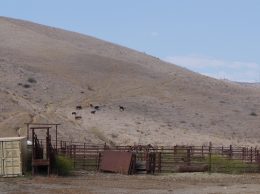Water restrictions are coming to the Tri-Counties, but businesses can help.
For some cities, restrictions are already here. Morro Bay, Pismo Beach and Montecito won’t be watering lawns midday or serving water in restaurants unless customers ask for it. And other cities such as Santa Barbara are considering similar restrictions. Unless the heavens miraculously open, most of our region will see some sort of water conservation rules.
There are some businesses — farmers, restaurants, paper factories — that require a lot of water. But many companies have more flexibility, and now is a better time than ever to reevaluate your business’ water use and try to improve efficiency. Any investments you make now will also pay off in the form of reduced costs on an ongoing basis. Who doesn’t like lower overhead?
We urge businesses in the region to resist any temptation to spike their usage to secure a better position in the event of rationing. Instead, we urge business to take the lead, showing their employees and communities they are ready to do their part to make it through the drought.
Here are nine tips for conserving water.
• Perform an evaluation. Several cities and counties in the region have green business certification programs. Often these offer questionnaires or other evaluations that can help a business get a handle on its water use and identify ways to reduce use. Improvements can even lead to a green certification that sits well with customers and employees.
• Take a peek for leaks. Do regular checks for leaks, with special attention to out-of-the-way pipes and appliances such as dishwashers or refrigerators with chilled water, where leaks can go unseen.
• Consider high-efficiency fixtures. This can be anything from the usual sinks and toilets to washers, dishwashers or showerheads. Check around for city or county rebate programs that might defray costs.
• Check the water pressure. If the water pressure in your building’s lines is too high, it can cause faucets and sprinklers to become less efficient. A simple pressure valve could save water — and money.
• Install “desertscape” or other drought-tolerant landscaping. Bright green grass and foliage might look nice, but it’s unnatural for our region and sucks up quite a bit of water. Consider rock gardens and cacti and yucca. Done right they can be lovely, and they’re much more in line with the natural environment.
• Catch rainwater or air conditioning condensation. Water costs money, so why let it go to waste? Some of the new storm water rules in Ventura County have mandated catching rain water runoff anyhow. Turn those rules around and save some money doing it.
• Use reclaimed water. Reclaimed water, which is usually treated waste water, is cheaper than fresh, potable water and is perfect for landscape irrigation or industrial uses.
• Start an employee awareness program. Teaching your staff how to be water-efficient has a multiplier effect for the community.
• Don’t forget marketing. Water will be in the news and on your customers’ minds this year. So if your business is doing its part to conserve a vital resource, don’t miss out on the chance for some positive brand association.
It’s understandable that businesses will chafe at some of the restrictions — we’re not convinced that the no-water-unless-asked-for rule at restaurants saves all that much of the blue stuff. But behind every crisis is an opportunity to lead in the community, and business should do its part.






 Print
Print Email
Email

















